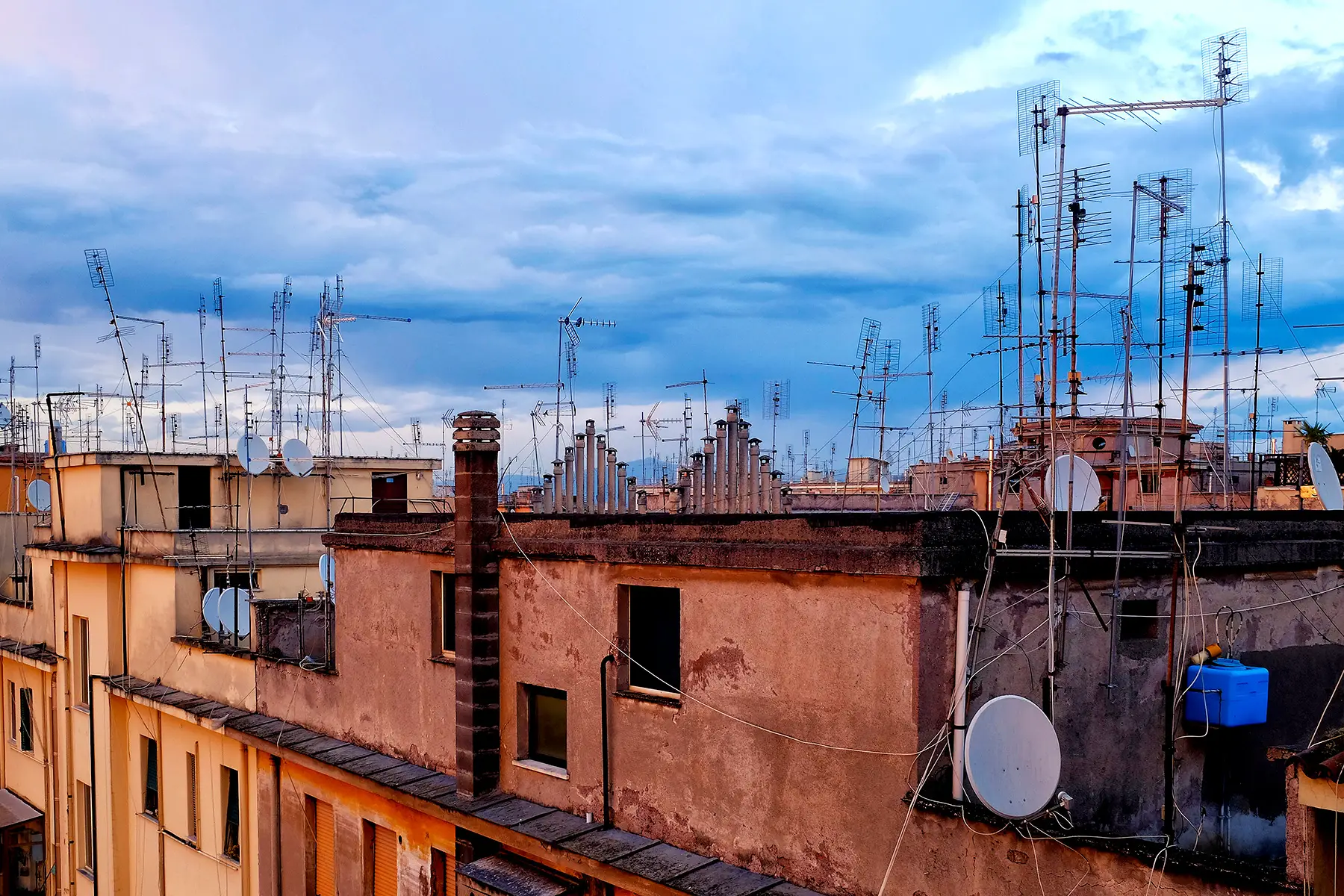As an international moving to Italy, you will undoubtedly have a lot going on in your life. Even before you get there, you will be thinking about getting a visa, how to move your belongings, and perhaps even how to find a job. Of course, once there, you will be busy exploring the incredible food and drink, getting to know the local culture, and visiting the many wonderful destinations and top-tier museums.
However, it’s also important to know what’s going on in your new country. Keeping on top of the news is not only interesting, but it will also help you understand local politics, government, and finance. You’ll even gain insight into Italian culture, attitudes, and opinions and perhaps learn some useful Italian phrases.
To help you navigate the vast news landscape in Italy, we cover the following topics:
- The Italian media landscape
- Where to get the news in English in Italy
- Italian newspapers and magazines
- TV and radio news channels in Italy
- Italian news websites
- Social media news sources in Italy
- Alternative news and citizen journalism in Italy
- Italian news sources to avoid
- Tips on getting reliable news in Italy
- Useful resources
Ground News
Get every side of the story with Ground News, the biggest source for breaking news around the world. This news aggregator lets you compare reporting on the same stories. Use data-driven media bias ratings to uncover political leanings and get the full picture. Stay informed on stories that matter with Ground News.
The Italian media landscape
Italy’s broad media scene covers the full spectrum of political ideologies. There are numerous national daily and weekly newspapers, most of which are run by private owners. In addition, there is an array of news websites, some of which correspond to print newspapers. There is also a wide range of private regional and local newspapers and websites across the country.

However, when it comes to TV and radio, the situation is a little different. Rai is the main state broadcaster and owns several TV channels and radio stations. For example, most Italian homes will receive free-to-air channels like Rai1, Rai Premium, Rai Sport, and Rai News 24.
There are also several national and regional radio stations specializing in particular topics. For example, Rai Radio 3 is a national station focusing on classical music and opera, while Rai Südtirol specializes in German-language programs for the Trentino-Alto Adige and South Tyrol regions. Of course, there are plenty of commercial TV channels and radio stations, too.
Although the number of Italians getting their news from traditional media outlets has declined in recent years, around 15% of them get their news from a print publication, according to the Reuters Institute for the Study of Journalism. Meanwhile, 75% of people get their news online, and 70% from TV.
A question of languages
Expats moving to Italy should know that its news is mostly in the Italian language. Although this is good news if you’re learning Italian, finding local news in English can be challenging. This is especially true in smaller towns and rural areas, where many locals speak little English anyway.
A fragile trust
Despite being avid consumers of local media, Italians have a deep distrust of their news outlets. In fact, only 35% of Italians say they trust news sources. In addition, only 34% consider news media very important to society. This could be due to the pressure that outside influences place on the news in Italy. There are economic considerations, of course, but there are also issues with press freedom.

Questionable press freedom
In Italy, the news technically benefits from the freedom of press guaranteed by the 1948 Constitution. However, the reality is quite different. In fact, Italy ranked 58th in the Reporters Without Borders (Reporters Sans Frontières – RSF) World Press Freedom Index 2022. This was far lower than its 2021 ranking of 41. RSF notes that the threat from organized crime is a particular pressure on Italy’s freedom of press, especially in the country’s south.
Where to get the news in English in Italy
English-language newspapers
For many newcomers to Italy, getting news can be a little tricky because the country does not produce many English-language newspapers. However, specialty foreign bookstores in big cities, like Rome (Roma) and Milan (Milano), will carry major English-language broadsheets from overseas. As such, you might be able to find papers like The International New York Times, the Financial Times, and The Guardian.
If you are looking for English-language news with a focus on Italy, though, you may still have a few options. Below are some of the most popular Italian print news media in English:
- La Stampa – Since 1867, this Italian national daily has brought national and international news to residents from its headquarters in Torino. However, the broadsheet also occasionally produces a version in English that expats find useful. Nowadays, the paper takes a center-left standpoint.
- Italics Magazine – Based in Rome, this independent online magazine covers everything Italy-related. It produces fact-based insights and analyses of politics, culture, society, and travel, as well as primary source interviews with Italians engaged in all areas of the country.
- Romeing – This insider guide covers everything you need to know about living like a local in Rome. Featuring articles on events, exhibitions, nightlife, restaurants, and tours, the lifestyle magazine is completely devoted to life as an expat in the capital of Italy. Also available for Florence!
- The American – Founded in March 2004, this is an independent monthly magazine based in Rome that offers English-language articles about Italian politics, culture, and life. It features 20 professional journalists as regular columnists.
- Wanted in Rome – Covering everything from politics and current affairs to sports, the economy, and lifestyle, this is an English-language monthly magazine for expats. It also includes a classifieds section that lists jobs, houses, and more.
- The Florentine – Established in 2005, The Florentine is a popular English-language monthly magazine based in Florence. It covers Florentine news, events, arts, culture, lifestyle, and community.

English-language news TV stations
Like books and papers in Italy, TV news stations in English can be hard to come by because Italian channels are far more popular. However, with some effort, expats moving to the country can still access a few English-language news channels.
Most expats will be able to access BBC World News because the channel is part of Italy’s digital TV system. Additionally, if you can get a satellite that picks up the Astra1 cluster, then you will also be able to watch CNBC, CNN, Euronews, and Skynews.
English-language news websites and social media
Because the internet is so readily available across Italy, news often makes its way across the country online. As such, many residents get daily updates through local news websites and social media accounts.
Of course, the news-related social media profiles with the greatest following include the most popular outlets such as La Repubblica, Il Sole 24 Ore, and Corriere della Sera. Whether you are wondering about local healthcare developments, what the Italian government is doing, or any other important local news, these sites will help you stay up to date:
- ANSA – The Agenzia Nazionale Stampa Associata is a not-for-profit cooperative and Italy’s national newswire service. On the website, you will find short but informative news stories about everything from politics and technology to sports and culture. Although the main site is in Italian, there is a full English edition for expats struggling to learn the local language.
- The Local, Italy – Perhaps one of the most popular sites in Italy for English-language news, this is a digital broadsheet. It covers a wide array of news and lifestyle topics, though you will need to subscribe to the site to access most articles. The site has a handy Italian expression of the day section that expats will find useful for picking up popular Italian phrases.
- EIN News – This Italian newswire service holds a variety of Italian and international news articles and press releases
- ItaliaMia – Although more offbeat, this website curates Italy news from major English-language publications across the world, including Reuters, Fox News, and The Guardian
- Euronews Italy – This Italian section of the popular European news site provides updates in English
Italian newspapers and magazines
National Italian newspapers
Italy’s national newspapers cover a broad spectrum of political opinions. Some publications may already be familiar to in-the-know expats, as brands like Corriere della Sera and La Repubblica are very popular. However, it’s important to be aware of some newspapers’ political leanings, as bias might affect the accuracy of what you’re reading.

Below are the most popular newspapers in Italy by readership:
- Corriere della Sera – With over 1.7 million readers, this conservative-liberal broadsheet is Italy’s most popular and one of its most respected
- La Repubblica – Another popular news source in Italy, this social-liberal broadsheet garners nearly 1.5 million readers across the country
- La Stampa – With headquarters in Turin, this liberal broadsheet boasts around 822,000 readers
- Il Fatto Quotidiano – With its left-wing populist leanings and alignment with the Five Star Movement political party, this compact newspaper has been increasing its readership in recent years
- Il Giornale – This daily tabloid has around 281,000 readers, and its political alignment wavers between liberal conservatism and right-wing populism. It is also part of the Berlusconi family’s media holdings.
Regional or local newspapers
There are numerous regional and local newspapers across Italy, including:
- Il Messaggero – Provides news from Lazio, Marche, Umbria, and Abruzzo
- Il Resto del Carlino – Publishes eighteen local editions including Reggio Emilia, Marche, and Romagna
- Il Gazzettino – Covers eight locations in northeast Italy
- La Nazione – Has fourteen editions that cover regions such as Tuscany, Umbria, and Liguria
- L’Eco di Bergamo – Publishes news from Bergamo province, Lombardy
- L’Unione Sarda – Covers Sardinia
In addition to these very local papers, many of the major national newspapers also have regional editions. For example, Corriere della Sera publishes local newspapers in major Italian cities and regions. As such, you can find city-specific editions in places like Milan, Bergamo, Venice, and Turin. Similarly, La Repubblica produces local versions for nine major cities, including Florence, Naples, and Genoa.
Weekly or periodical newspapers or magazines
Of course, there are also a lot of magazines in Italy covering news, celebrity gossip, sports, and more. Among the most popular are weekly TV listing magazines, such as TV Sorrisi e Canzoni. However, lifestyle and sports magazines are far more popular. As such, the magazines with the highest circulation in Italy include:
- DiPiù – A weekly tabloid
- Sette – A weekly supplement from Corriere della Sera containing news, politics, and lifestyle
- iO Donna – Corriere della Sera’s women’s weekly supplement
- Il Venerdì di Repubblica – La Repubblica’s Friday supplement dealing with current affairs and culture

Specialist newspapers
Although they do not cover as wide a range of topics as the national dailies, some specialist news sources in Italy are very popular. These might deal with sports, fashion, religion, and other themes. No matter your interests, you’ll likely find an Italian-language publication that covers it. Some of the most popular specialist magazines include:
- Sports – La Gazzetta dello Sport
- Fashion – Elle, Grazia
- Catholic news – Famiglia Cristiana, Avvenire
- Finance and business – Milano Finanza, Il Riformista, ItaliaOggi, Il Sole 24 Ore
TV and radio news channels in Italy
There are some 412 TV channels in Italy, though only a few focus specifically on news. The main TV news channel in Italy is Rai News 24, a free-to-air service that offers 24-hour news coverage by the state broadcaster Rai. This is the only public TV news channel in Italy – private companies own the others. For example, Class CNBC is a financial news TV channel with Class Editori as the majority shareholder. TG24, part of the Sky network, is also popular, as is Mediaset’s TGcom24.
Similarly, state broadcaster Rai owns most of the news-focused radio stations in Italy. These include Rai Radio 1, Rai Isoradio, and Rai Gr Parlamento. However, there are some private national news radio stations, too, including:
In addition to these national stations, there is an array of local radio channels, such as Giornale Radio and Radio Popolare in Rome.
Italian news websites
Some 64% of residents in Italy get their news online. As such, the country follows most others in the trend of increasing digital news consumption. Of course, the websites of the major national newspapers are the most popular digital news sources in Italy. For example, the Corriere della Sera website has 3.26 million daily unique users on average, while La Gazzetta dello Sport’s website has 2.65 million, and La Repubblica has around 2.62 million users.

There are, of course, plenty of other news websites in Italy. Many of these are independent, online-only news sources, while others are the digital arm of popular TV news channels. Some of the best-known include:
Social media news sources in Italy
Many Italian news outlets have a presence on social media. Facebook is by far the most popular social network in Italy, with some 35.9 million users. However, Instagram, LinkedIn, Pinterest, and Twitter are also commonly used. Around 50% of Facebook users access news in Italy via the platform, compared to 30% of WhatsApp users and 20% of those on YouTube. Popular apps for news include Twitter, Google News, Corriere della Sera, and Il Post.
Interestingly, although 23% of Italians report getting their news from social media platforms, only 25% of these users consider the information on these platforms reliable. This could be part of the reason why 22% of Italian respondents have left at least one social platform in 2021. In addition, a Politico study found that during a recent Italian election, local politicians and influencers spread election-related misinformation through their profiles.
Alternative news and citizen journalism in Italy
A poll by Redfield & Wilton Strategies found that 51% of Italians do not trust the media to accurately report the news, a proportion which decreased by 11% during 2020. Because of this, Italy has a growing landscape for alternative news sources and citizen journalists.

AgoraVox, a French site in operation in Italy since 2008, is one of the most popular sites for citizen journalism in the country. It covers a range of news stories in Italy, as well as international current affairs. In addition, many locals will visit the following alternative or citizen journalism sites:
Interestingly, there is only one well-known satirical and news parody site in Italy. Lercio is similar in style to The Onion and covers a range of topics, such as news, politics, sport, and more.
Italian news sources to avoid
Fake news and disinformation are hot topics in any country, and Italy is no exception. However, when it comes to trusting their news sources, Italians are highly savvy consumers. They have a medium trust in their media and low confidence in internet sources and social media news. They are also quite diligent about fact-checking the news stories they come across. In fact, 61% of Italians (PDF) say they check the veracity of the news they read using a search engine often or very often.
In addition, locals are more likely to read alternative online news sources, such as Fanpage or Il Post.it, than mainstream newspapers. However, these are not necessarily well-trusted, and many other outlets are notorious for their political partisanship.
Tips on getting reliable news in Italy
There are some resources out there specifically designed to help you assess news articles and sources for accuracy, bias, and reliability. Some of the services operating in Italy include:
The key to stopping the spread of misinformation is learning how to spot it. Here are some top tips from the experts:
- Read the news across multiple outlets (with different political leanings) to try and get a more accurate understanding
- Ask locals which news sources they use regularly and trust
- Remember that many newspapers in Italy are very partisan, so read them with caution
- If you’re still in doubt, check the Italian Digital Media Observatory (IDMO) and the European Digital Media Observatory (EDMO) for information on disinformation and media literacy resources
Useful resources
- Autorità per le Garanzie nelle Comunicazioni (AGCOM) – the Italian telecommunications regulatory authority
- Bufale.net (in Italian) – a fact-checking website that provides analysis of news sources
- Italian Digital Media Observatory – assesses disinformation in Italy
- European Digital Media Observatory – provides information on fake news and media literacy in Europe








